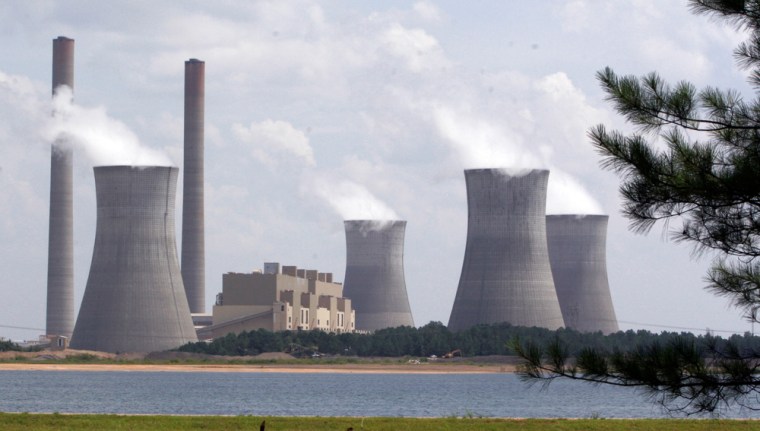The Bush administration on Friday rejected regulating greenhouse gases blamed for global warming, saying it would cause too many job losses.
In a 588-page federal notice, the Environmental Protection Agency made no finding on whether global warming poses a threat to people's health, reversing an earlier conclusion at the insistence of the White House and officially kicking any decision on a solution to the next president and Congress.
Environmentalists criticized the move, while the U.S. Chamber of Commerce worried it left open the door for mandatory reductions.
EPA Administrator Stephen Johnson insisted that regulating greenhouse gases via the Clean Air Act was not workable.
"If our nation is truly about serious regulating greenhouse gases, the Clean Air Act is the wrong tool for the job," Johnson told reporters. "It is really at the feet of Congress."
The White House on Thursday rejected EPA's conclusion three weeks earlier that the 1970 Clean Air Act "can be both workable and effective for addressing global climate change." Instead, EPA said Friday that law is "ill-suited" for dealing with climate change.
White House press secretary Dana Perino said that President Bush is committed to further reductions but that there is a "right way and a wrong way to deal with climate change."
The wrong way is "to sharply increase gasoline prices, home heating bills and the cost of energy for American businesses," she said. "The right way, as the president has proposed, is to invest in new technologies."
At the just concluded G-8 summit in Japan, Bush and other world leaders called for a voluntary 50 percent reduction in greenhouse gases worldwide by 2050 but offered no specifics on how to do it.
In a major setback to the administration, the Supreme Court ruled last year that the government has authority under the Clean Act to regulate greenhouse gases as a pollutant. Bush has consistently opposed that option.
Senate bid to regulate failed
Supporters of regulating greenhouse gases could get only 48 votes in the 100-member Senate last month. The House has held several hearings on the problem but no votes on any bill addressing it. The two major presidential candidates, Republican John McCain and Democrat Barack Obama, have endorsed variations of the approach rejected by the Senate.
In its voluminous document, the EPA laid out a buffet of options on how to reduce greenhouse gases from cars, ships, trains, power plants, factories and refineries.
"One point is clear: The potential regulation of greenhouse gases under any portion of the Clean Air Act could result in unprecedented expansion of EPA authority that would have a profound effect on virtually every sector of the economy and touch every household in the land," the EPA's Johnson said in a preface to the federal notice.
EPA said that it encountered resistance from the Agriculture, Commerce, Energy and Transportation departments, as well as the White House, that made it "impossible" to respond in a timely fashion to the Supreme Court decision.
"Our agencies have serious concerns with this suggestion because it does not fairly recognize the enormous — and, we believe, insurmountable — burdens, difficulties, and costs, and likely limited benefits, of using the Clean Air Act" to regulate greenhouse gas emissions, the secretaries of the four agencies wrote to the White House on July 9.
Friday's action caps months of often tense negotiations between EPA scientists and the White House over how to address global warming under the major federal air pollution law.
The document released Friday is much more cautious than a determination made in December by the agency that found greenhouse gases endangered health and welfare, and it also appears to reverse findings of drafts released in May and June that found the Clean Air Act could be an effective tool for reducing greenhouse gases.
Activists were quick to criticize the EPA's move.
"The administration needs to stop passing the buck and start regulating dangerous greenhouse gases," Kieran Suckling, executive director of the Center for Biological Diversity, said in a statement. "The decisions we make today will not only determine whether the polar bear and thousands of other species will be driven extinct by global warming, they will determine whether human health and the economy will be wracked by dangerous climate change."
Suckling noted that in December 2007 then EPA Associate Deputy Administrator Jason Burnett transmitted a draft finding to the White House concluding that greenhouse gases threaten public welfare. Burnett, a Democrat, resigned last June, citing differences with the administration's climate policy.
Frank O'Donnell, president of Clean Air Watch, an environmental advocacy group, said that "EPA's approach to this has been completely thrown out by the White House, which is only attempting to stall any kind of clean up."
Rep. Edward Markey, chairman of the House Select Committee on Global Warming, called the administration's findings "the bureaucratic equivalent of saying that the dog ate your homework."
"The White House has taken an earnest attempt by their own climate experts to respond to the Supreme Court's mandate to address global warming pollution and turned it into a Frankenstein's monster," said Markey, D-Mass.
However, representatives of industry still expressed concern over suggestions in the document that a future administration might regulate emissions.
"EPA has set forth a road map which literally throws the entire way which we manage the environment and economy in complete turmoil," said Bill Kovacs, a vice president at the U.S. Chamber of Commerce.
"We want them to say it is clearly the inefficient way to go," he said of mandatory emission reductions.
